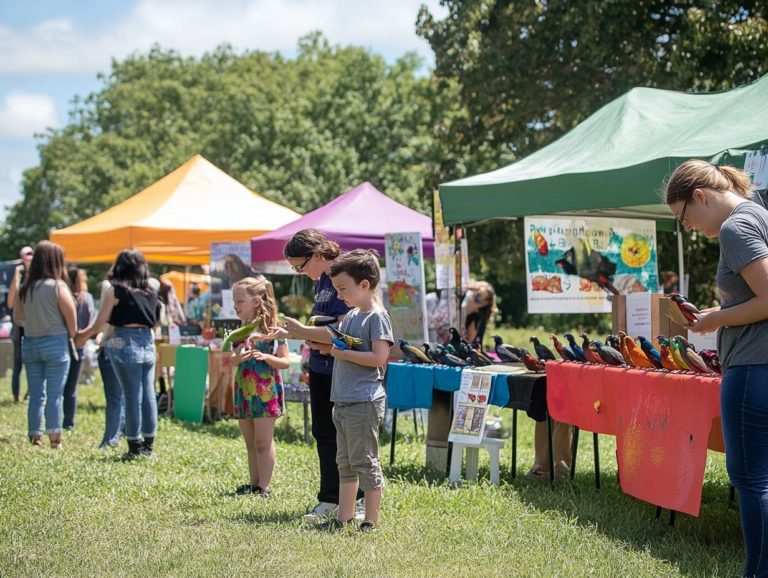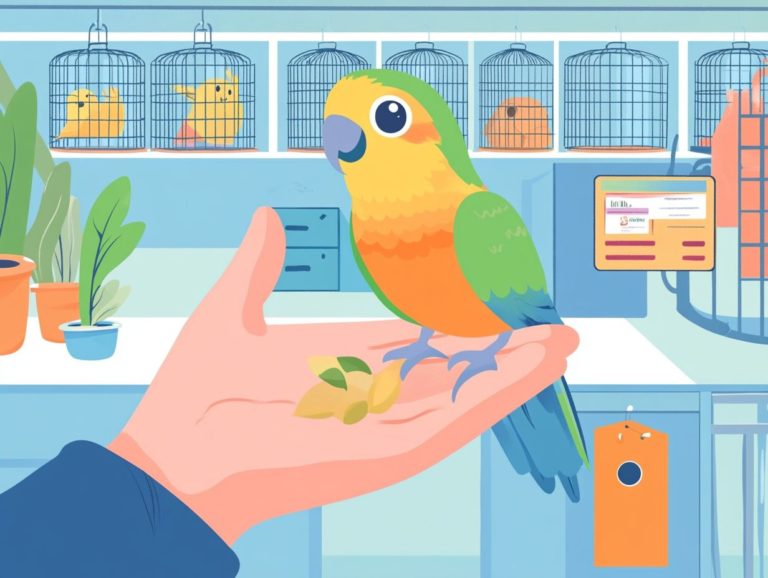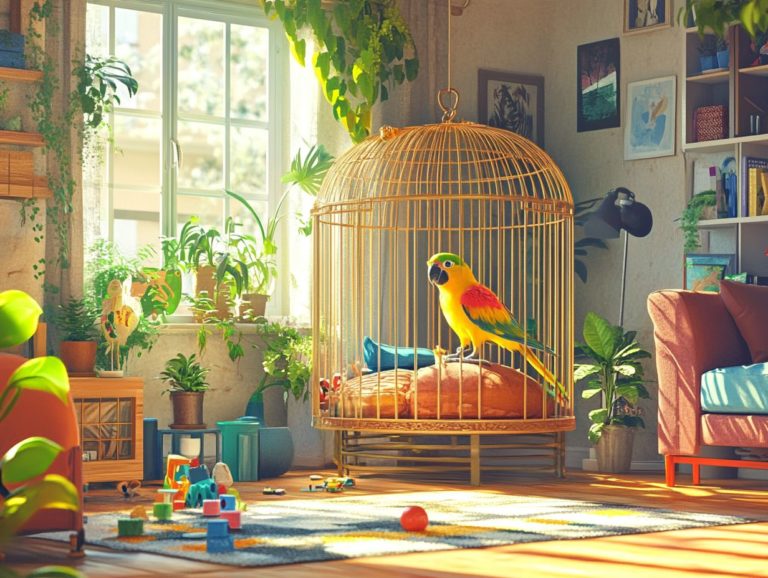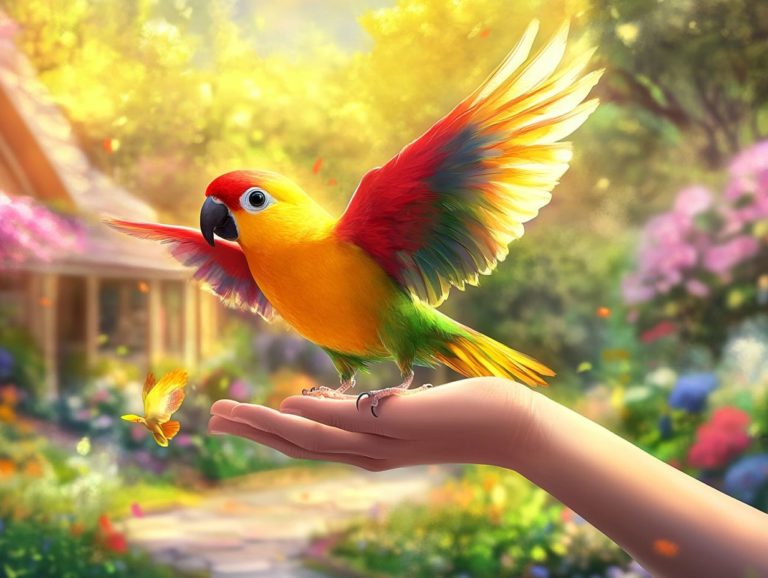Bird Adoption and Your Family: What to Consider
Bird adoption can be a truly enriching choice for your family, providing not only companionship but also a deep emotional connection.
Welcoming a feathered friend into your home brings a host of advantages, from their joyful presence to their beneficial effects on the environment.
As you prepare for the adoption journey, consider important factors such as your family’s dynamics and living circumstances.
Let s find the perfect bird for you today!
Contents
- Key Takeaways:
- Benefits of Adopting a Bird
- Factors to Consider Before Adopting a Bird
- Preparing for the Adoption Process
- Choosing the Right Bird for Your Family
- Caring for Your Adopted Bird
- Frequently Asked Questions
- What should I consider before adopting a bird for my family?
- What types of birds are best for families?
- What are the potential risks of adopting a bird for my family?
- Is it better to adopt a bird or buy one from a breeder?
- What should I do if my child loses interest in the bird after we adopt it?
- Are there any legal restrictions on bird ownership in my area?
Key Takeaways:
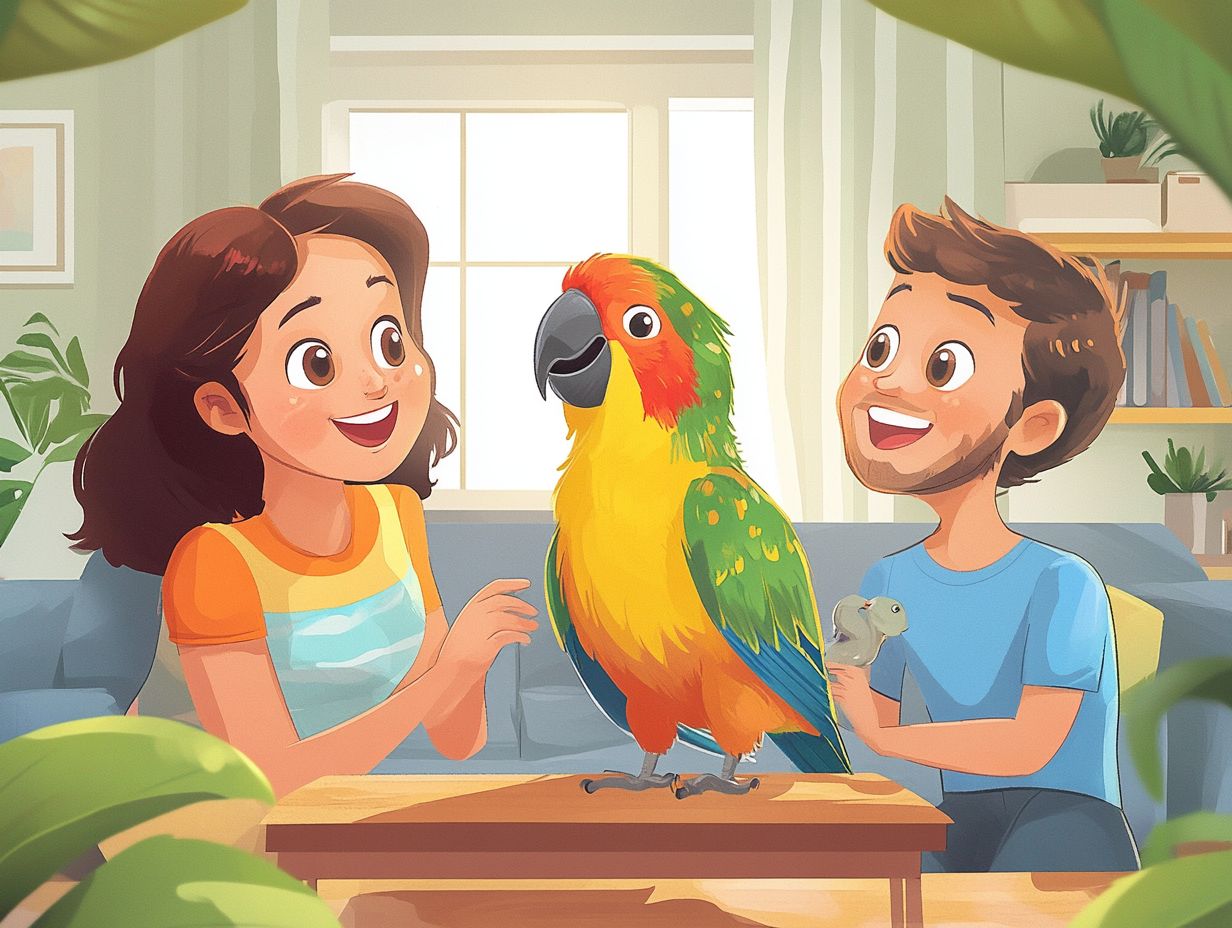
- Bird adoption brings numerous emotional and environmental benefits to your family.
- Consider your family dynamics and living situation carefully to ensure a successful match.
- Proper preparation and research can help you choose the right bird for your family.
What is Bird Adoption?
Bird adoption is a meaningful choice that allows you to provide a loving home for birds in need, whether they are rescues or looking for a new place to call home due to unforeseen circumstances. This journey often involves important choices, including how to choose the right bird for your family, and weighing the responsibilities of caring for an avian companion, such as proper feeding, socialization, and engaging activities that promote their well-being throughout their lives.
Avian welfare organizations are invaluable allies in this process, guiding you through the adoption journey and ensuring that both the birds and their new owners are a perfect match.
You ll find a rich variety of birds available for adoption, ranging from animated parrots like the Senegal Parrot and Amazon Parrot that thrive on interaction to awe-inspiring raptors like the Common Buzzard, White-tailed Sea Eagle, and Red-tailed Hawk, each requiring specialized care and environments.
Understanding the unique backgrounds and biological needs of each species is crucial, as these factors shape their behavior, dietary requirements, and socialization preferences. This knowledge enables you to make well-informed decisions, ultimately enhancing the quality of life for your new feathered friend.
Benefits of Adopting a Bird
Adopting a bird is not just a choice; it s an adventure filled with joy and companionship! It enriches emotional, social, and environmental dimensions not just for the bird, but for you as well.
By giving a rescue bird the opportunity for a fulfilling life, you also cultivate companionship and engage in unique interactions that can significantly enhance your emotional well-being.
Emotional and Environmental Benefits
The emotional and environmental benefits of adopting a bird are truly remarkable, offering you rewarding companionship that fosters greater awareness of avian welfare and conservation. When you welcome a bird like the White-tailed Sea Eagle or Black Kite into your home, you create a bond that enriches your life through delightful interaction and socialization.
These feathered companions do more than just bring joy; they serve as a constant reminder of the beauty and fragility of nature. Their playful antics can lighten your mood and reduce stress, cultivating a nurturing environment for both you and your new friend.
By choosing to adopt rather than purchase, you’re also playing a vital role in protecting species like the Pied Avocet, Black Kite, and Common Buzzard, ensuring their remarkable presence continues to grace their natural habitats.
Engaging in responsible adoption practices is essential, as it underscores the importance of awareness and action in preserving biodiversity and deepening your connection with the world around you.
Factors to Consider Before Adopting a Bird
Before you embark on the rewarding journey of adopting a bird, it’s imperative to consider several factors that can profoundly influence both your well-being and that of your feathered companion, as outlined in understanding bird adoption: a complete guide.
Think about your family dynamics and living situation; these elements play a vital role in ensuring a harmonious environment. Caring for birds, whether it’s an impressive Red-tailed Hawk or a vibrant Macaw, demands a genuine commitment to their health, safety, and overall quality of life.
Creating a suitable environment for them is not just a responsibility it’s a promise to enhance their lives and enrich your own.
Family Dynamics and Living Situation
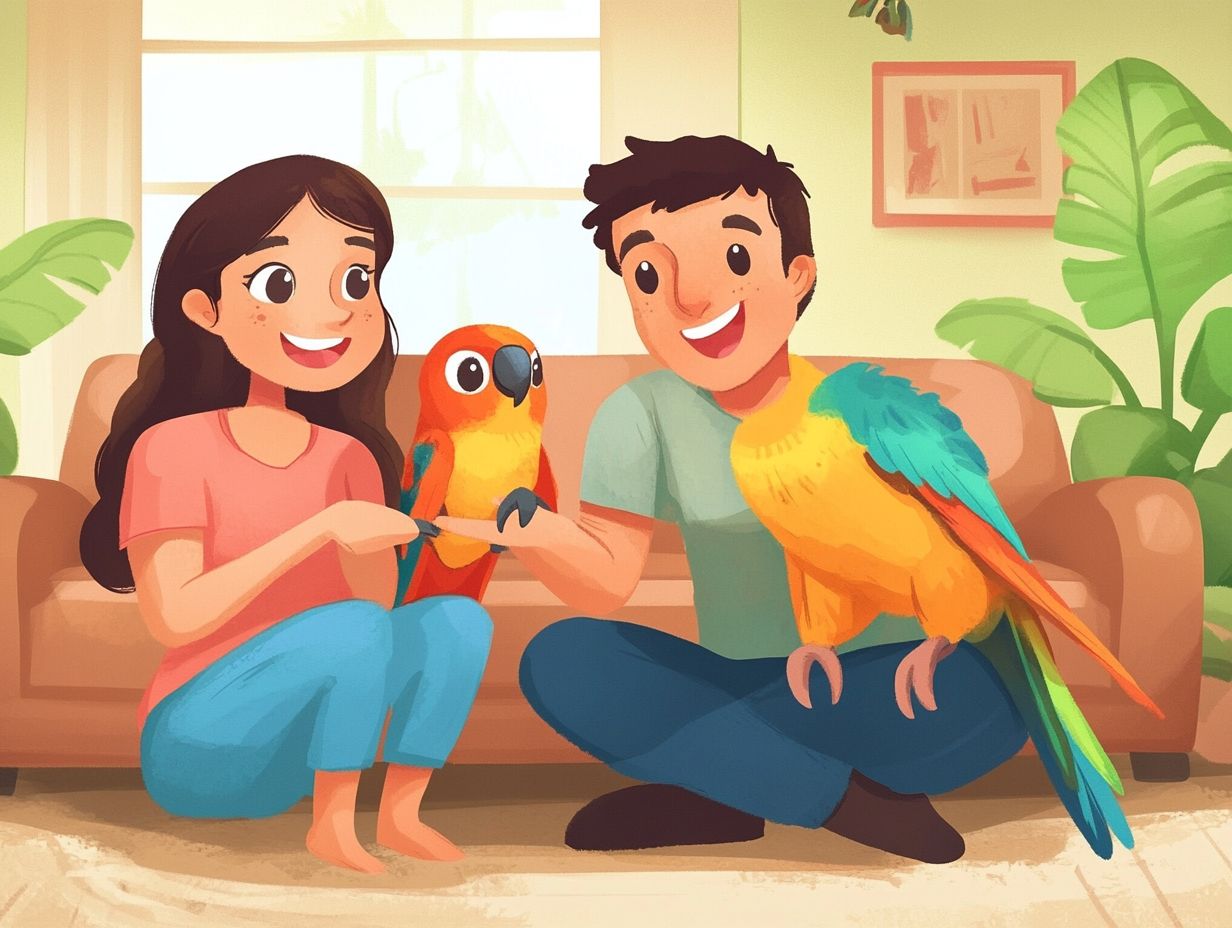
Understanding your family dynamics and living situation is crucial when considering the adoption of a bird, as these elements significantly influence the bird’s adjustment and overall well-being in its new home. For more information, check out the bird adoption process.
Social species, such as the Amazon Parrot and Cockatoo, thrive on interaction and require a supportive family that values their unique behaviors and needs.
For example, living in an apartment as opposed to a house can greatly affect how a bird acclimates to its surroundings. In smaller spaces, noise levels and anxiety can escalate, especially if there are other pets in the mix.
It s essential for everyone in the household, including your furry friends, to be ready for this transition. Gradually introducing the concept of a new feathered companion can facilitate a smoother adjustment.
By establishing boundaries and creating safe zones for both the bird and other pets, you can cultivate a harmonious atmosphere that minimizes stress and ensures everyone feels secure in their territory.
Preparing for the Adoption Process
Get ready to craft a safe and exciting home for your new bird! Preparing for the bird adoption process is an essential step that guarantees a seamless transition for both your new avian family member and your household.
This preparation involves tailoring a safe and enriching habitat to their needs, establishing a consistent routine for feeding, cleaning, and interaction, and seeking guidance from a bird doctor to address any specific health considerations.
By taking these thoughtful steps, you create an ideal environment for your feathered companion.
Steps to Take Before Bringing Home a Bird
Before you bring home a bird, you must take several important steps to ensure your new companion feels comfortable and safe.
Start by preparing its habitat. This means creating a secure environment with ample space and enriching toys for stimulation. Establish a reliable feeding schedule that meets the bird’s nutritional needs.
You must choose the right cage size; it should be spacious enough for your bird to spread its wings and move freely.
Make sure it s equipped with suitable perches that cater to its natural instincts to climb and explore. Incorporating various textures and widths will keep your bird’s feet healthy and happy.
Selecting interactive toys is vital, as they encourage mental engagement and help prevent boredom, which can lead to behavioral issues.
Understanding your bird’s dietary preferences is equally important; a well-rounded diet is key to enhancing its health and longevity. Don t forget about regular cleaning routines maintaining a tidy environment not only promotes hygiene but also creates a happy, thriving atmosphere for your feathered friend.
Choosing the Right Bird for Your Family
Selecting the perfect bird for your family demands thoughtful deliberation, taking into account several crucial factors such as species suitability and the unique needs of your potential feathered companions. For more insights, check out what you should know about bird adoption.
Each bird species, whether it’s the vivacious Macaw or the more serene Ring-billed Gull, possesses distinct traits that can significantly impact family dynamics and overall well-being.
Factors to Consider when Selecting a Bird
When selecting a bird, you need to consider factors such as the bird’s personality, care requirements, and expected lifespan to ensure a harmonious relationship. Different species, like the playful Cockatoo and the more reserved Common Buzzard, present unique challenges and rewards that should align with your family’s lifestyle.
Understanding the behavioral traits of each type is crucial. It includes socialization needs, noise levels, and interaction preferences. For instance, some birds thrive on social interaction and require frequent engagement. Others might prefer solitude or a quieter environment. This awareness significantly influences your care routines.
A chirpy parrot, for example, will need more stimulation and time outside the cage. Meanwhile, a quieter species may be perfectly content with a cozy spot to relax.
By acknowledging these aspects, you can make informed decisions that match your household dynamics, including parenting responsibilities. This ultimately fosters a nurturing environment for your future feathered companion.
Caring for Your Adopted Bird
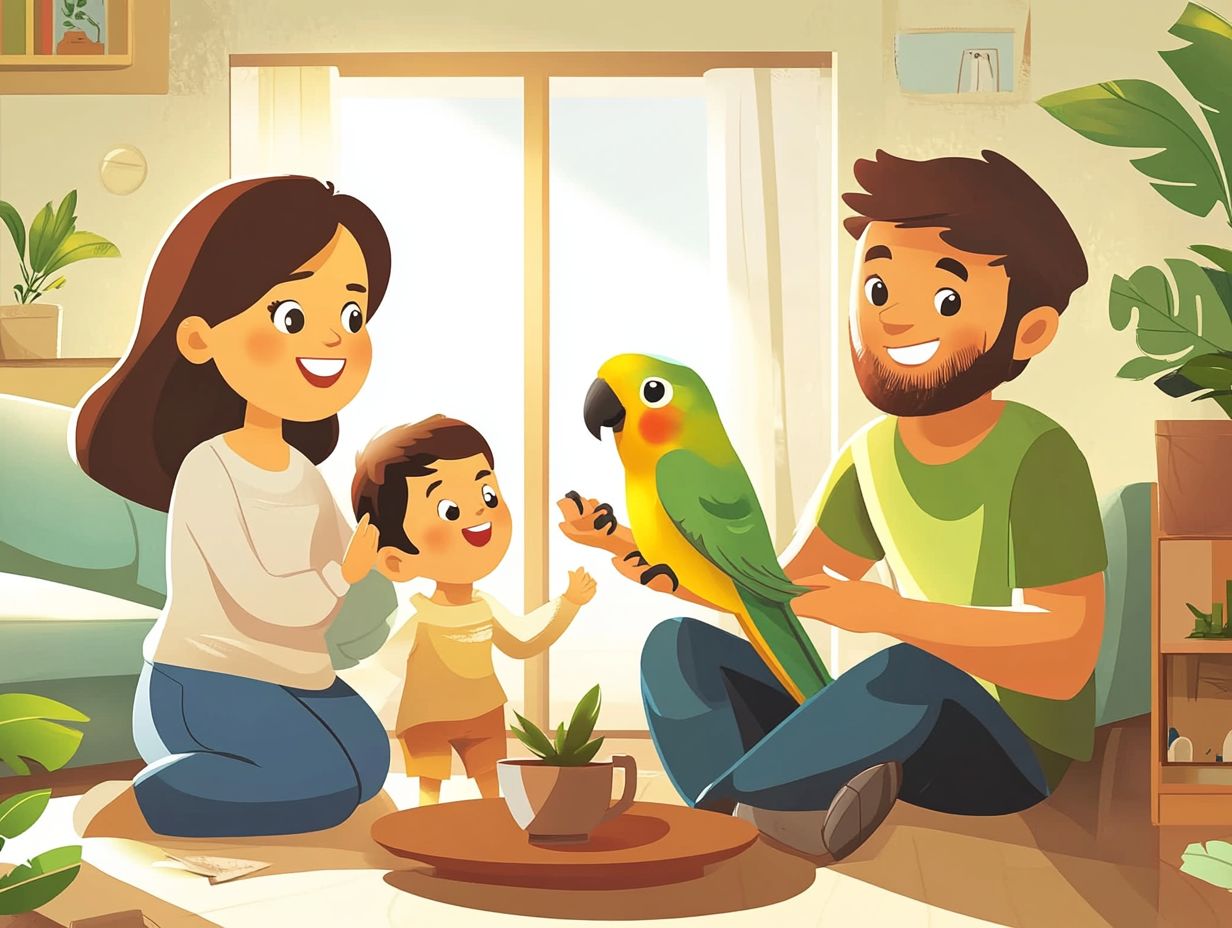
Caring for your adopted bird requires a thoughtful approach that includes best practices in feeding, hygiene, enrichment, and effective communication.
By providing a diet specifically tailored to their species, along with engaging toys and ample social interaction, you create a caring environment that keeps them healthy and happy.
Best Practices for Bird Care
Implementing best practices for bird care is essential to promoting the health and happiness of your avian companion. This includes proper feeding, hygiene, and socialization. Whether you have a lively Amazon Parrot or a regal White-tailed Sea Eagle, creating an environment tailored to their specific needs is key to ensuring they lead fulfilling lives.
Ensuring a varied diet that meets their nutritional needs is just the beginning. Regular cleaning of their habitat is critical to preventing illness. A tidy living space not only enhances their quality of life but also minimizes stress, allowing them to flourish.
Fostering a strong bond with these feathered friends through consistent interaction is vital. Engaging with them daily nurtures trust and enriches their social lives. Providing toys and activities that mimic natural behaviors like foraging and climbing can significantly boost their mental stimulation.
By creating a vibrant environment, you encourage exploration, keeping them active and happy.
Final Thoughts on Bird Adoption
Bird adoption is a significant commitment to creating a safe and loving environment for your avian companions. It highlights the necessity of understanding their unique needs and responsibilities. Each bird, whether it’s a playful Macaw or a regal Caspian Tern, deserves a family that truly appreciates the joy and companionship they offer. For those considering this path, it’s important to recognize the importance of bird adoption and its many benefits.
When you choose to adopt, you not only gain a loyal friend but also play a vital role in rescuing birds from uncertain futures. The experience is further enriched by the distinctive personalities and quirks each bird brings. This fosters a bond that can transform your daily life.
As a potential adopter, it’s essential to recognize the emotional and environmental benefits of your choice. By adopting, you’re supporting the invaluable efforts of avian welfare organizations dedicated to nurturing and loving these creatures, including insights on how to give your adopted bird a happy home.
So, consider taking this meaningful step. Join the movement to champion bird adoption, enhancing not only your life but also the lives of the feathered friends in need.
Frequently Asked Questions
What should I consider before adopting a bird for my family?
Before adopting a bird, it’s important to consider the time, space, and financial commitment required to properly care for a feathered friend. Birds can live for many years and require daily interaction, a large cage, and a varied diet, among other things.
Ready to find your feathered companion? Start your adoption journey today!
What types of birds are best for families?
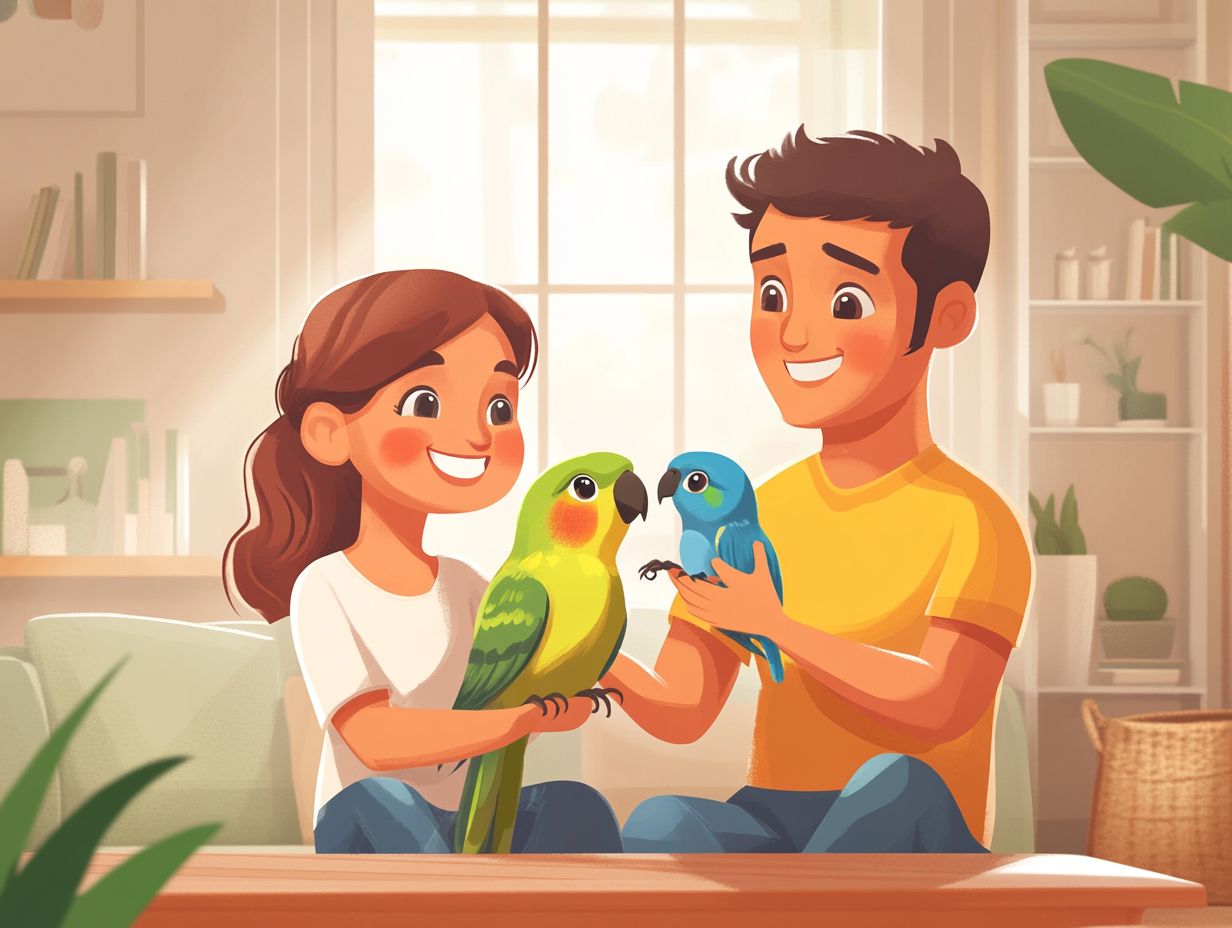
Some of the best birds for families include parakeets, cockatiels, and canaries. These smaller birds are social and easier to handle, making them ideal for children. However, it’s vital to research the specific needs of any bird you consider before adopting.
What are the potential risks of adopting a bird for my family?
Birds can carry diseases, like psittacosis, which can spread to humans. Regular vet check-ups and good hygiene when handling them are crucial. Some birds may have behavioral issues that can pose risks to children.
Is it better to adopt a bird or buy one from a breeder?
Choose adoption! It gives a bird a second chance and brings joy to your family. Adopting from a local animal shelter not only helps a bird in need, such as a Senegal Parrot or Red-tailed Hawk, but shelters often have a variety of birds and provide helpful information and resources for proper care.
What should I do if my child loses interest in the bird after we adopt it?
Have fun discussions with your kids about bird care before adopting! If your child loses interest, it’s essential for the adults in the household to step up and continue caring for the bird. You can also explore how to encourage kids to support bird adoption and, if needed, reach out to a local bird club or bird-savvy friends for guidance and support.
Are there any legal restrictions on bird ownership in my area?
Yes, some areas may have restrictions on owning certain bird species or may require a permit for ownership. It s important to research and understand the laws and regulations in your area before adopting a bird for your family.


